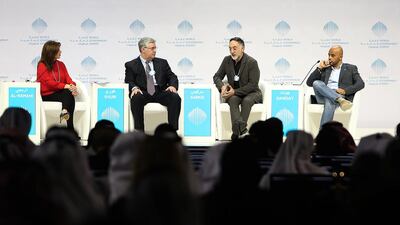DUBAI // The lack of inclusion of young Arabs in society, as well as a lack of security, has forced a great number to migrate to the west, according to regional experts.
But they say the phenomena should not be considered a handicap for the region if these young Arabs bring their skills back to their home countries.
“Economy is one of the important factors in the ‘brain drain’, as well as Arab society, as it did not allow Arab populations, especially young people, to participate in decision-making,” said Dr Fadlo Khuri, president of the American University of Beirut. “The truth is that Arab governments did not give importance to building the future by devoting importance and money to scientific development. Investing in science is lacking in the Arab world.”
According to reports by the Arab League, only 5 per cent of Arab students leaving to western countries move back to their home country. “When it comes to the brain drain, I do not think it is always a negative thing,” said Hashim Sarkis, dean of the school of architecture and planning at Massachusetts Institute of Technology.
“There can be positive aspects to it and we must take advantage of them. If there are people who graduated from American universities or have written doctoral theses, this puts Arabs in a good light and their money sent back to their countries is a positive thing.”
He said making an Arab name for themselves abroad was favourable. “We need to change the concept of migration,” he said.
Mr Sarkis said countries like the UAE were attracting talent. “Maybe when peace comes back to Syria, things will change,” he said. “There are huge opportunities in the Arab world and American universities have noticed that there is a loophole in the field of design and innovation and there aren’t enough specialists in those fields.”
He spoke of plans to create a Dubai Design School in cooperation with MIT to help focus on innovation, not just to regain the youth which moved away, but to develop the capacity for innovation. “I believe we can create certain fields for innovation and creativity in the Arab world and this way, we’ll be able to regain those brains,” he added.
But for Mohammed Gawdat, vice president of business innovation at Google X, the problem is more than just numbers.
“I believe those people who migrate to work in technology are very well educated and they have a good head on their shoulders,” he said. “They go to Silicon Valley and those are the names we know about and make a huge difference when they move.
“That world enables them to use their brains and put their brains to good ends.”
“The two key problems we haven’t been able to solve are the question of resources and a lack of stability in the Arab world.
“If I want to invent something new in robotics, I’ll find out I don’t have enough scientific research in the Arab world to enable me to make that invention while I’d have those resources in California, so it’s not just money, it’s about capacities.”
With 50 per cent of the Arab population under 25, Dr Khuri said they constituted a huge opportunity for the region. “They must not return straight after graduating,” he said. “They need to work abroad, gain skills and work experience and we need to make sure they will take part in the development process.”
cmalek@thenational.ae

